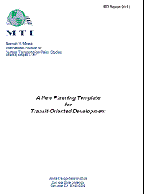- 408-924-7560
- mineta-institute@sjsu.edu
- Donate
A Planning Template for Nonwork Travel and Transit Oriented Development
The Mineta Transportation Institute (MTI) at San José State University assigned a project team to design a planning template for transit-oriented development (TOD) that incorporates an understanding of nonwork travel, that is, trips for shopping, eating out, and engaging in recreational and cultural activities. Nonwork trips are growing in signifigance and now account for four of every five trips. At the same time, TOD has become a popular planning response to the impacts of metropolitan growth. Some planners believe that TOD will induce more pedestrian and transit trips and will reduce the average length and frequency of household auto travel. This effect is assumed to result from improved accessibility to employment and nonwork venues located in compact, mixed-use centers. Planning professionals in many MPOs also suggest that if multiple centers are linked by high quality transit, such as light or heavy rail, access is enabled to the broad range of nonwork activities.
The project arrived at these essential findings: (1) Venues for nonwork activities are very numerous and geographically dispersed. 2) The spatial environment for nonwork activities is the result of growing prosperity, technical innovation, and a dynamic, competitive marketplace. (3) The consumer marketplace will provide many more places to go than mass transit can cost-effectively serve. (4) Current metropolitan planning methods and modeling tools focus on the work trip and do not adequately account for the complexity of nonwork trips and their linkage to work trips.
These findings support the need for a new regional planning process to complement current methods. One recommended approach is that metropolitan communities establish a Nonwork Travel Improvement Planning Process using a multidisciplinary expert advisory group interacting with a core, Internet-enabled, professional transportation planning staff. An iterative interaction across varied but relevant skill sets could be achieved through a Backcasting Delphi process. The focus of the interaction would be on understanding the ramifications of consumer and retail industry behavior for TOD and other new transportation strategies, and then assessing the available strategies for cost-effectiveness in reducing the impacts of growth and automobility in a complex and uncertain metropolitan market.
DICK NELSON
Dick Nelson is president and senior researcher at Integrated Transport Research, a Washington State nonprofit corporation. He is also a Research Associate at the Mineta Transportation Institute. His recent work has focused on the integration of land use and transportation, specifically the concept of transit-oriented development. From 1977 through 1992, he was a member of the Washington State House of Representatives, where he worked to establish state laws that address growth management, state transportation planning, the linkage of transportation and land use, incentives to use transit and carpool, and transportation demand management. Over the past two decades, he has been a member of numerous state and local boards, commissions, and advisory committees related to transportation. He earned the ScD from Massachusetts Institute of Technology and the BS from the University of Washington.
JOHN NILES
John Niles is founder and president of Global Telematics, a contract research and policy consulting firm based in Seattle, Washington that focuses on the interaction of transportation and telecommunications. In addition, he is a Mineta Transportation Institute Research Associate. Lately, the focus of his work has been the response of transportation policy to the network economy. He has led research studies on telecom-driven travel reduction for several Metropolitan Planning Organizations and the United States Department of Energy. He is a member of the Telecommunications and Travel Behavior Committee of the Transportation Research Board and participates in the Washington State Telework Coalition. He earned the MS from the Graduate School of Industrial Administration at Carnegie Mellon University and the SB from Massachusetts Institute of Technology.
-
Contact Us
San José State University One Washington Square, San Jose, CA 95192 Phone: 408-924-7560 Email: mineta-institute@sjsu.edu






